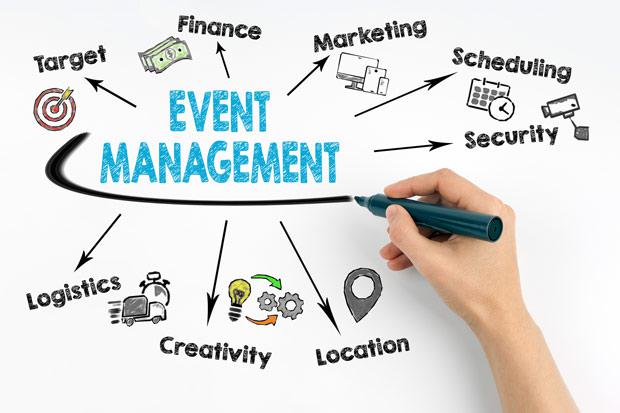A Deep Dive Into Just How Event Management Functions to Create Memorable Experiences
Event management is an intricate self-control that combines different components to craft unforgettable experiences. It requires a clear understanding of the event's function and target market. Planners must navigate budgeting, logistics, and advertising and marketing to guarantee a smooth execution. Each part plays an essential duty in achieving the preferred impact. The trip does not end with the event itself. There are insights to reveal that can form future undertakings.
The Basics of Event Management
Effective event management includes a series of important concepts that guide the planning and execution of successful occasions. At its core, it entails comprehending the event's function, target market, and wanted end results. Identifying the target demographic is important, as it educates decisions connected to content, marketing, and logistics.
Budgeting is one more essential element, ensuring that resources are assigned efficiently while satisfying the event's goals. This includes planning for unexpected costs that may arise.
Time management plays an important role, as event managers should establish a comprehensive timeline to collaborate different tasks and milestones.
Additionally, reliable interaction among stakeholders, suppliers, and staff member is necessary to ensure positioning and avoid misunderstandings.
Risk management should be considered, with backup plans in location to resolve potential obstacles, thereby improving the general experience for guests and assuring a seamless implementation of the event.
Secret Roles in Event Planning
In event planning, recognizing key functions is necessary for successful implementation. The event coordinator is accountable for supervising logistics and making certain all elements straighten with the vision. Furthermore, effective supplier management is vital for preserving quality and promoting solid partnerships throughout the planning procedure.
Event Planner Responsibilities
An occasion planner manages the complicated components of event planning, guaranteeing smooth implementation from conception to final thought. They are in charge of conceptualizing the event theme, establishing spending plans, and developing timelines to keep the project on the right track. Sychronisation with stakeholders, including customers, venue managers, and volunteers, is important to align expectations and assist in interaction. The planner additionally manages logistics, such as catering, transportation, and innovation needs, making sure all elements work sympathetically. They carry out website gos to, handle timetables, and troubleshoot problems that might arise during the event. Post-event, the coordinator evaluates the event's success, gathering comments and examining results to notify future jobs. This diverse function needs strong organizational abilities, focus to information, and reliable interpersonal interaction.
Supplier Management Fundamentals
Guiding via the landscape of supplier management is important for effective event preparation. Efficient vendor management involves identifying, picking, and working with vendors who offer crucial solutions, such as wedding catering, audiovisual assistance, and decoration. Event planners have to preserve strong interaction with suppliers to guarantee that all elements line up with the event's vision. Key duties include the vendor supervisor, who looks after agreements and negotiations, and the logistics planner, in charge of on-site configuration and implementation. It's imperative to develop clear expectations and timelines, cultivating a collective environment that improves the overall experience. By prioritizing these components, event coordinators can browse prospective challenges, guaranteeing that every detail contributes to a smooth and unforgettable event.
Crafting a Vision: Idea Advancement

Once a vision is established, it comes to be necessary to equate it right into workable parts. This consists of specifying the atmosphere, selecting suitable venues, and figuring out the event's design. Teaming up with stakeholders, consisting of enrollers and companions, further refines the concept, guaranteeing that all celebrations share a merged understanding of the event's objective. Inevitably, a strong vision not just boosts attendee interaction however additionally establishes the stage for remarkable experiences that reverberate long after the event wraps up.
Budgeting and Source Allowance
With a clear vision in place, the next action in event management includes careful budgeting and resource allotment. This vital phase guarantees that all required elements are funded and aligned with the event's purposes. Event supervisors start by estimating prices connected with location choice, food catering, enjoyment, and advertising. They produce a comprehensive budget that lays out each group, permitting for openness and responsibility.
Resource allotment expands past financial resources; it likewise incorporates personnels. Identifying group roles, responsibilities, and timelines is necessary to ensure efficiency. Event managers should also think about contingencies for unanticipated expenses or changes in scope, establishing a buffer within the budget plan.
Prioritizing investing on components that boost visitor experiences is essential. By tactically designating sources, event managers make the most of impact while maintaining financial control. This regimented technique not only cultivates effective occasions yet also constructs credibility and depend on with stakeholders and participants.
Logistics: The Backbone of Event Execution
While budgeting lays the groundwork for an occasion, logistics work as its foundation, guaranteeing that every aspect is carried out efficiently and efficiently. charlotte event companies. This incorporates this contact form a vast array of activities, including place option, transportation arrangements, and devices procurement. Efficient logistics management calls for careful planning and control to assure that all elements align with the event's timeline and objectives
Key elements of logistics consist of inventory management, where materials and products are tracked to avoid shortages, and staffing, which entails recruiting and training workers to take care of different jobs. Interaction is additionally vital, as it assists in partnership amongst vendors, sponsors, and the event team.

Advertising and Promo Methods
Reliable advertising and promotion techniques are necessary for making the most of attendance and engagement at an event, as they create passion and excitement amongst possible individuals. Event managers employ a mix of traditional and electronic advertising methods to reach their target audience. Social media site systems, email campaigns, and targeted advertisements are typically utilized to produce buzz and foster community interaction. Partnerships with influencers or industry leaders can improve reliability, while involving content such as videos and endorsements can resonate with potential attendees.
On top of that, leveraging event-specific hashtags and creating shareable graphics urges natural promotion amongst guests. Early bird ticket deals and special promos can incentivize enrollment, in addition increasing interest. In addition, a well-designed site that offers very easy navigation and clear info concerning the event can improve the individual experience. By executing these marketing and promo techniques, event managers can assure higher presence and ultimately produce a remarkable experience for all participants.

Determining Success: Responses and Assessment
Success in event management depends upon durable feedback and examination mechanisms. These processes are crucial for figuring out the effectiveness of an event and recognizing areas for enhancement. By collecting input from attendees, coordinators can assess fulfillment levels, comprehend preferences, and determine general influence. Surveys and interviews work as useful devices for accumulating measurable and qualitative information, enabling thorough analysis.
Additionally, reviewing crucial efficiency indicators (KPIs) such as participation rates, interaction degrees, and roi (ROI) gives a clearer photo of event success. Post-event debriefing sessions with try this website the planning group additionally add insights, promoting a society of continuous renovation.
Ultimately, a methodical technique to comments and analysis not just improves future occasions but additionally reinforces relationships with stakeholders. By implementing these strategies, event managers can create memorable experiences that resonate with individuals and drive recurring interaction.
Frequently Asked Inquiries
Just How Do Event Supervisors Take Care Of Unanticipated Obstacles Throughout an Event?
Event managers address unanticipated obstacles by continuing to be tranquility, reviewing the scenario, and carrying out contingency plans - charlotte event companies. They communicate efficiently with their team, adjust rapidly, and focus on options to guarantee the event continues smoothly and successfully
What Modern Technology Devices Are Vital for Modern Event Management?
Necessary modern technology devices for contemporary event management include event enrollment software program, job management applications, participant interaction platforms, and analytics devices. These resources streamline procedures, enhance interaction, and enhance overall event experiences for coordinators and participants alike.
Just How Do Cultural Differences Influence Event Preparation and Implementation?
Cultural differences substantially affect event preparation and execution. They impact themes, customs, communication designs, and expectations, necessitating customized approaches to assure inclusivity and respect, eventually shaping the total experience and success of the event.
What Are the Honest Considerations in Event Management?
Moral considerations in event management include openness, sustainability, social sensitivity, and inclusivity. Coordinators need to focus on fairness, respect diverse target markets, minimize environmental impact, and warranty ease of access to develop accountable and unforgettable experiences for all individuals.
How Can Sustainability Be Integrated Into Event Preparation?
Sustainability can be integrated into event planning by utilizing eco-friendly materials, decreasing waste, sourcing local vendors, implementing carbon balanced out programs, and promoting electronic services to lower paper usage, consequently improving ecological check awareness within the event's structure.